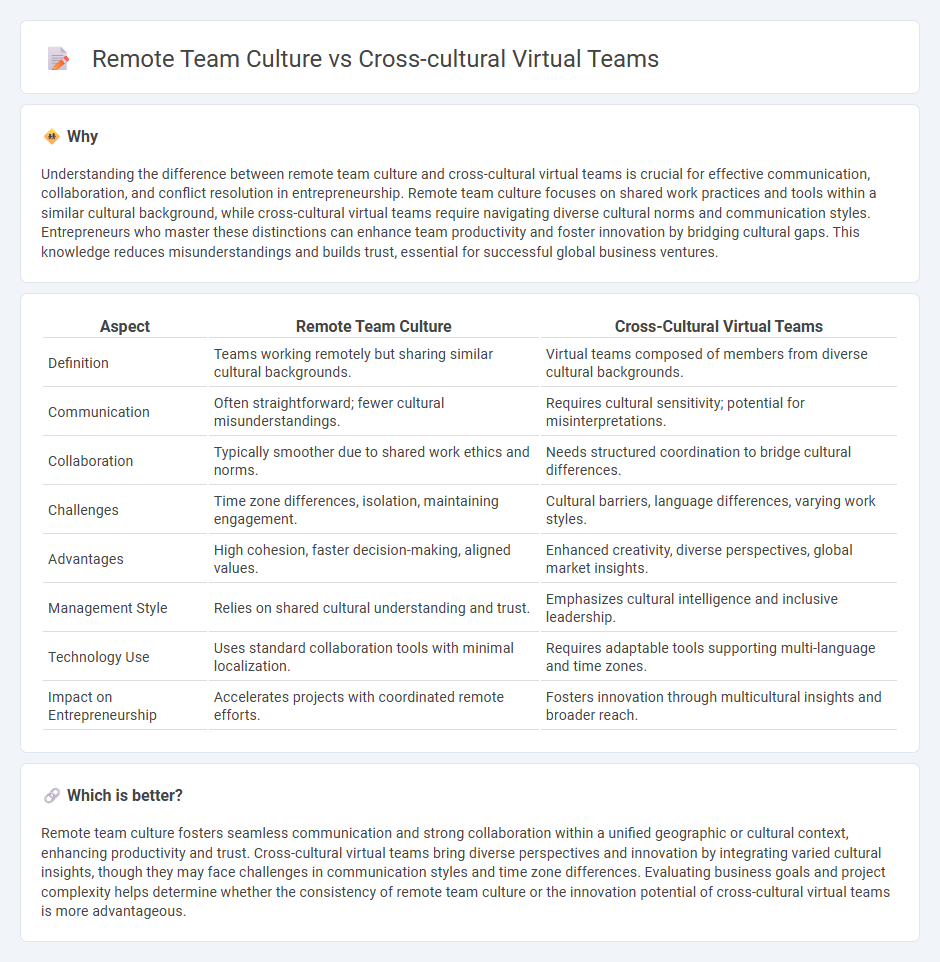
Entrepreneurship thrives when remote team culture prioritizes clear communication, trust, and flexibility, enabling seamless collaboration despite physical distances. Cross-cultural virtual teams add complexity by integrating diverse cultural perspectives, which can drive innovation but require heightened cultural intelligence and adaptive leadership. Explore strategies to strengthen remote and cross-cultural team dynamics for entrepreneurial success.
Why it is important
Understanding the difference between remote team culture and cross-cultural virtual teams is crucial for effective communication, collaboration, and conflict resolution in entrepreneurship. Remote team culture focuses on shared work practices and tools within a similar cultural background, while cross-cultural virtual teams require navigating diverse cultural norms and communication styles. Entrepreneurs who master these distinctions can enhance team productivity and foster innovation by bridging cultural gaps. This knowledge reduces misunderstandings and builds trust, essential for successful global business ventures.
Comparison Table
| Aspect | Remote Team Culture | Cross-Cultural Virtual Teams |
|---|---|---|
| Definition | Teams working remotely but sharing similar cultural backgrounds. | Virtual teams composed of members from diverse cultural backgrounds. |
| Communication | Often straightforward; fewer cultural misunderstandings. | Requires cultural sensitivity; potential for misinterpretations. |
| Collaboration | Typically smoother due to shared work ethics and norms. | Needs structured coordination to bridge cultural differences. |
| Challenges | Time zone differences, isolation, maintaining engagement. | Cultural barriers, language differences, varying work styles. |
| Advantages | High cohesion, faster decision-making, aligned values. | Enhanced creativity, diverse perspectives, global market insights. |
| Management Style | Relies on shared cultural understanding and trust. | Emphasizes cultural intelligence and inclusive leadership. |
| Technology Use | Uses standard collaboration tools with minimal localization. | Requires adaptable tools supporting multi-language and time zones. |
| Impact on Entrepreneurship | Accelerates projects with coordinated remote efforts. | Fosters innovation through multicultural insights and broader reach. |
Which is better?
Remote team culture fosters seamless communication and strong collaboration within a unified geographic or cultural context, enhancing productivity and trust. Cross-cultural virtual teams bring diverse perspectives and innovation by integrating varied cultural insights, though they may face challenges in communication styles and time zone differences. Evaluating business goals and project complexity helps determine whether the consistency of remote team culture or the innovation potential of cross-cultural virtual teams is more advantageous.
Connection
Remote team culture thrives on effective communication, trust, and shared values, which are essential for managing cross-cultural virtual teams. Diverse cultural perspectives enhance innovation and problem-solving, while cultural empathy and adaptability drive collaboration across different time zones and workstyles. Leveraging technology platforms that support real-time interaction and cultural inclusivity fosters a cohesive entrepreneurial environment crucial for achieving business goals.
Key Terms
Communication Styles
Cross-cultural virtual teams exhibit diverse communication styles influenced by cultural norms, language barriers, and varying interpretations of nonverbal cues, which can affect collaboration and productivity. Remote team culture emphasizes establishing consistent communication protocols, fostering transparency, and leveraging technology to bridge geographic gaps and align team members. Explore strategies to enhance communication effectiveness in both cross-cultural virtual teams and remote team environments for optimal performance.
Cultural Intelligence
Cross-cultural virtual teams require heightened cultural intelligence to effectively navigate diverse communication styles, values, and work ethics, which can differ significantly from those in remote team culture driven primarily by physical distance. Cultural intelligence enables team members to adapt behaviors, interpret cultural nuances accurately, and build trust across different cultural backgrounds, enhancing collaboration and performance. Explore detailed strategies to develop cultural intelligence and optimize both cross-cultural virtual and remote team dynamics.
Collaboration Tools
Cross-cultural virtual teams rely heavily on collaboration tools like Slack, Microsoft Teams, and Zoom to bridge language barriers and time zone differences, fostering seamless communication and cultural exchange. Remote team culture emphasizes consistent use of project management software such as Asana or Trello to ensure task clarity and accountability across dispersed members. Explore best practices and top collaboration tools to enhance productivity and cultural cohesion in diverse virtual teams.
Source and External Links
5 Tips for Building Strong Cross-Cultural Virtual Teams - Highlights the benefits and challenges of cross-cultural virtual teams and offers five practical steps to improve virtual team communication, emphasizing the role of cultural diversity in fostering innovation and the need to manage communication barriers effectively.
What Are 5 Strategies for Working in Cross-Cultural Virtual Teams? - Provides key strategies such as cross-cultural training, appointing designated leaders, and fostering intercultural communication skills that help virtual teams leverage diverse perspectives for better performance.
Closing the Virtual & Cultural Gap: Managing Cross Cultural Remote Teams - Discusses challenges like cultural dominance and time zone differences in managing remote cross-cultural teams and suggests intentional connection, team-building, and expert facilitation to enhance collaboration and respect cultural differences.
 dowidth.com
dowidth.com